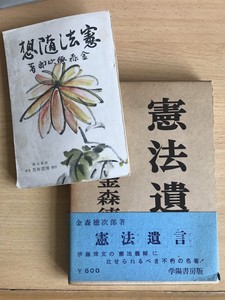
農暦五月十一日。芒種。気温摂氏33.5度で灼熱。芒種の日では17年ぶりの暑さの由。さすがに寝苦しい日が続き、それでも夏になれば湿度が少し下がり窓を全開で夜風も心地よいが今は多湿でさうもいかず冷房を+2度で微風に設定してやつと寝入る。
▼昨日読んでゐた岩波『世界』で金森徳次郎の憲法についての話あり。今では覚へてゐる人も少ないが金森は戦前の内閣法制局長官で戦時体制で罷免され戦後は貴族院議員、吉田内閣で新憲法制定担当の国務大臣。憲法9条で「戦争放棄はじつに美しい企て」と語つた強い理想主義。「どんなに精緻なる憲法を定めても「緊急事態」という口実で憲法が破壊される恐れがある」といふ発言が70年後の今、重くのしかゝるとは。
緊急勅令その他につきましては緊急勅令及び財政上の緊急処分は行政当局者にとりましてはじつに調法(重宝)なものであります。しかしながら調法という裏面におきましては国民の意思をある期間有力に無視し得る制度であるということが言えるのであります。だから便利を尊ぶか或いは民主政治の根本の原則を尊重するか、そういう分かれ目になるのであります。そこでもし国家の伸展の上に実際上差し支えがないという見極めがつくならば如此き財政上の緊急措置或いは緊急勅令というものはないことが望ましいと思うのであります。
と見識。金森著作は古書で入手し2冊手元にあるが今どきの自民党や非立件の国会議員どもに読ませたいくらゐ。
▼イギリスで市民狙ふ爆破テロ続いたことでメイ首相がネット制限に言及。どんな危険でも自由は守られないといけない!と声を大にしたいところだが世の中これだけ自由の顛末でおかしくなつてくると「ある程度の自由が制限されるなかでの社会の安定」も致し方ないどころか真っ当な判断なのか、とすらと思へてしまつたのが周末FTのLunch with FTに登場のマレーシアのマハティール元首相による「自由は制限されるべき」(こちら)。
“When you have a prime minister who is corrupt, then you can be sure that a country cannot be anything else but corrupt,” he says in a soft, slightly quavering voice. “From a country which was quite well admired as a model of how a developing country can achieve growth, we became known as one of the 10 most corrupt countries in the world ― that is how much change took place under Najib.”
と自らの功績である経済成長と社会安定の「マレーの奇跡」が後継者選びで失敗したジレンマ。だから賢人がある程度非民主的手段ででも社会安定させることで民草は豊かさの恩恵を得る、と。その政策の最大の成功がシンガポールとなるわけで東南アジア諸国がシンガポールを成功モデルにするどころかアフリカのルワンダがシンガポール型成長を目指してゐる、と。そこまでは驚かぬ。だが今では欧州や先進国でも社会不安定のなかシンガポールモデルが注目されてゐるといふ。だがそれでもやはりシンガポールモデルの問題を冷静に理解すべきとするのがThe Economist誌の“How foreigners misunderstand Singapore”(こちら)。
Like the proverbial blind men describing an elephant by feeling just one part of the beast, each of these admirers gets something right about Singapore, but all miss the big picture.
Such social engineering (public housing & medical system in Singapore) would appal Western voters and be struck down by Western courts. Yet Singaporeans accept it. Paternalism has enforced racial calm. The country’s Chinese majority has been spared the atrocities visited on the Chinese diaspora in, say, Malaysia and Indonesia. More important, the trade-off that Lee Kuan Yew offered still holds: illiberal politics in exchange for good government and high living standards.
Singapore’s leaders vigorously defend their reputations with defamation suits, and gerrymander constituencies to help preserve the ruling party’s majority. But they deliver safe streets, first-rate health care, good public transport and a clean, responsive public administration. In distorted form, elections allow voters to affect policy: after the ruling party suffered its worst-ever performance in 2011, winning “just” 60% of the vote, it took a more populist line and won resoundingly four years later.
Lee’s bargain is hard to emulate. Both parts have been essential to Singapore’s success. Yet admirers such as Mr Duterte and Hun Sen, Cambodia’s strongman, are adept only at the authoritarian bit, without the clean government or wealth creation. Singapore’s rich-world admirers, meanwhile, lack the tame politics that allow Singapore’s rulers to set policy without worrying too much about the next election―or their citizens’ civil liberties.
@fookpaktsuen: インドの知識階級は英国への隷属には反発するが国内政治のやり方について英国のそれは最良である。(インドのネルー元首相)